What’s Up?
I took a break from taxes on Wednesday and spent most of the day exercising and answering a slew of e-mails that had been on the back burner. I enjoyed my easy half-mile swim at 4pm.
Canon 100-400 II On Sale
The Canon EF 100-400mm f/4.5-5.6L IS II USM lens is on sale right now from B&H for only $2049!
The Streak
Today marks thirty-eight days in a row with a new educational blog post. This one took about two hours to prepare. With all of my upcoming free time, the plan now is to break the current record streak of (I think) four hundred eighty something … Good health and good internet connections willing.
Everybody’s Doing It…
Everybody’s buying and selling used gear on the BAA Used Gear Page. Sales recently have been through the roof. Selling your used (or like-new) photo gear through the BAA Blog or via a BAA Online Bulletin is a great idea. We charge only a 5% commission. One of the more popular used gear for sale sites charged a minimum of 20%. Plus assorted fees! Yikes. They recently folded. And eBay fees are now in the 13% range. The minimum item price here is $500 (or less for a $25 fee). If you are interested please e-mail with the words Items for Sale Info Request cut and pasted into the Subject line :). Stuff that is priced fairly–I offer free pricing advice, usually sells in no time flat. In the past few months, we have sold just about everything in sight. Do know that prices on some items like the EOS-1D Mark IV, the old Canon 500mm, the EOS-7D, and the original 400mm IS DO lens have been dropping steadily. Even the prices on the new 600 II and the 200-400 with Internal Extender have been plummeting. You can see all current listings by clicking here or by clicking on the Used Photo Gear tab on the right side of the yellow-orange menu bar at the top of each blog post.
Booking.Com
I could not secure the lodging that I needed for the UK Puffins and Gannets IPT in Dunbar, Scotland, so I went from Hotels.Com to Booking.Com and was pleasantly surprised. I found the rooms that I needed with ease at a hotel that was not even on Hotels.Com, and it was a nice hotel that I had seen in person. And the rates were great. If you’d like to give Booking.Com a shot, click here and you will earn a $25 reward.
Thanks to the many who have already tried and used this great service.
Revamped
I recently updated the IPT page. If you doubt that I am really slowing down, click here to see the meager IPT schedule. Right now there are only two US-based IPTs on the schedule. Best news is I now have two folks registered for the Fort DeSoto IPT so that will run. Do consider joining us if you would like to learn from the best.
Photographers Wanted
If you would like to learn to be a better bird photographer in person, consider joining me on either the Fort DeSoto IPT in late September or the San Diego IPT in January, 2018. With four folks signed up, DeSoto will offer practically private instruction. And you can tack on the In-the-Field/Meet-up Workshop Session on the morning of Tuesday September 26, 2017 for free. Scroll down for details. Click here for complete IPT info and the current but abbreviated schedule.


Gear Questions and Advice
Too many folks attending BAA IPTs and dozens of folks whom I see in the field, and on BPN, are–out of ignorance–using the wrong gear especially when it comes to tripods and more especially, tripod heads… Please know that I am always glad to answer your gear questions via e-mail.
Please Don’t Forget …
As always–and folks have been doing a really great job for a long time now–please remember to use the BAA B&H links for your major and minor gear purchases. For best results, use one of our many product-specific links; after clicking on one of those you can continue shopping with all subsequent purchases invisibly tracked to BAA. Your doing so is always greatly appreciated. Please remember: web orders only. And please remember also that if you are shopping for items that we carry in the BAA Online Store (as noted in red at the close of this post below) we would of course appreciate your business.
|
|
The DPP 4 Screen Capture for today’s featured imageBe sure to click on the image to see the larger version so that you can read the fine print |
The DPP 4 Screen Capture
There are several things to note on the DPP 4 screen capture for today’s featured image.
- 1-The RGB values for the WHITEs (with the cursor placed on the brightest spot on the bird’s left wing) came in at 246, 246, 246.
- 2-To achieve those perfect WHITEs I moved the dot on the Color fine-tune to the right, away from BLUE. As far as I know, I am pretty much the only nature photographer regularly taking advantage of this neat feature.
- 3-As this image was far from level, it would need some fancy stepping during the post-processing.
- Note that on this very overcast day I exposed miles to the right.
- Lastly, note that there are part of two birds that I opted to remove.
How can the bird’s eyes possibly be sharp?
I was curious as to how the bird’s eye’s could possibly be razor sharp with the AF point on its right foot. After giving it some thought I went back to DOFMaster.com and plugged in the approximate values. With a full frame body at 121mm, the wide open aperture of f/4, and an approximate 20 feet to the subject, the total depth of field worked out to 1.96 feet. With a bit less half of that (.93 feet or 11 1/4 inches) in front of the point of focus, there was just enough depth of field to cover the bird’s face. If you missed the Understanding a Vitally Important Depth of Field Concept item in August 28th blog post, it might behoove you to click here and start studying.
|
|
|
This image was created on the fabulous gannet boat trip morning on Day 4 of the 2017 UK Puffins and Gannets IPT with the hand held Canon EF 70-200mm f/4L IS USM lens (at 121mm) and my favorite gannets-in-flight camera body, the Canon EOS 5D Mark IV. ISO 800. Evaluative metering +2 1/3 stops off the gray sky: 1/3200 sec. at f/4 in Manual mode. Daylight WB. LensAlign/FocusTune micro-adjustment: zero. Center AF point/Manual selection/AI Servo/Expand/Shutter button AF and was active at the moment of exposure. The selected AF point was on gannet’s right foot yet the bird’s eyes are razor sharp … Be sure to click on the image to see the larger version so that you can check out those sharp eyes. Northern Gannet preparing to dive |
The Incredible Gannet Experience
You really owe it to yourself to enjoy a gannet chumming session or two in your lifetime. The action is so furious and frenetic that most folks are forced to quit after the first hour. You might remember that that is why I bring the smaller, lighter 70-200m f/4 to the UK. It also makes a great walk-around travel/Urbex lens. Dates and details for the 2018 UK Puffins and Gannets IPT will be announced here soon.
The Image Optimization
During the RAW conversion in DPP 4 (as noted above) I moved the Color fine-tune point to the right to line up the channels in the RGB histogram. That was done of course after entering my recipe for the 5D IV at ISO 800. Next and last was to move the Highlight slider to -1. Many folks do not realize how simple the adjustment for a DPP 4 RAW conversion are. Most times I am done in 30 seconds or so.
Once I brought the image in Photoshop I used my Patch Tool/Content Aware Fill technique to seamlessly eliminate the two extraneous gannets. Next I had to deal with the sliver of the far shoreline in the lower right corner. I toyed with the idea that it would be neat to include the far horizon but after one feeble attempt I decided to limit the image to sky only. I carefully selected the bird only first using the Quick Selection Tool (my keyboard shortcut W) and then refining the selection with Lasso Tool (+ to add, – to subtract). After feathering the selection I always make sure to save it (as recommended in DB II). Then I put the selection on its own layer (Command J) and ran my NIK Color Efex Pro 40/40 recipe on the bird only.
To juice up the somewhat boring sky I loaded the selection (Bird) and hit Shift + Command + I to invert the selection. Then I put the sky on its own layer and opened NIK Viveza. I increased the Structure to about 60 and the Saturation to about 40. Even the edges of the bird came out perfect and the sky looked a heck of a lot more dramatic. Lastly I sharpened the face with a Contrast Mask and did a bit of Eye Doctor work that including lightening the irises.
|
|
|
The BIRDS AS ART Current Workflow e-Guide (Digital Basics II) will teach you an efficient Mac/Photo Mechanic/Photoshop workflow that will make it easy for you to make your images better in Photoshop (rather than worse). That true whether you convert your images in DPP 4 or ACR. See the blog post here to learn lots more and to read a free excerpt. You can order your copy from the BAA Online Store here, by sending a Paypal for $40 here, or by calling Jim or Jennifer weekdays at 863-692-0906 with your credit card in hand. |
The BIRDS AS ART Current Workflow e-Guide (Digital Basics II)
Every single thing mentioned above (except for the Viveza on the sky trick) is covered in detail in the BIRDS AS ART Current Workflow e-Guide (Digital Basics II), an instructional PDF that is sent via e-mail. Learn more and check out the free excerpt in the blog post here. The new e-Guide reflects my Macbook Pro/Photo Mechanic/DPP 4/Photoshop workflow. Do note that you will find the RGB Curves Adjustment Color Balancing tutorial only in the new e-guide. Note: folks working on a PC and/or those who do not want to miss anything Photoshop may wish to purchase the original Digital Basics along with DB II while saving $15 by clicking here to buy the DB Bundle.
The two most recent MP4 Photoshop Tutorial videos releases go hand and hand with the information in DB II):
Folks who learn well by following along rather than by reading, can check out the complete collection of MP 4 Photoshop Tutorial Videos by clicking here.
You can learn how and why I and other discerning Canon shooters convert nearly all of their Canon digital RAW files in DPP 4 using Canon Digital Photo Professional in the DPP 4 RAW conversion Guide here. And you can learn advanced Quick Masking and advanced Layer Masking techniques in APTATS I & II. You can save $15 by purchasing the pair. Folks can learn sophisticated sharpening and (NeatImage) Noise Reduction techniques in the The Professional Post Processing Guide by Arash Hazeghi and yours truly.
If In Doubt …
If in doubt about using the BAA B&H affiliate link correctly, you can always start your search by clicking here. Please note that the tracking is invisible. Web orders only. Please, however, remember to shoot me your receipt via e-mail.
|
Obviously folks attending the IPT will be out in the field early and stay late to take advantage of sunrise and sunset colors. The good news is that the days are relatively short in October. Click on the composite to enjoy a larger version. |
The Fort DeSoto 2017 Fall IPT/September 22 (afternoon session) through the full day on September 25, 2017. 3 1/2 FULL DAYs: $1649. Limit 8/openings 4.
Fort DeSoto, located just south of St. Petersburg, FL, is a mecca for migrant shorebirds and terns in fall. There they join hundreds of egrets, herons, night-herons, gulls, and terns who winter on the T-shaped peninsula that serves as their wintering grounds. With luck, we may get to photograph two of Florida’s most desirable shorebird species: Marbled Godwit and the spectacular Long-billed Curlew. Black-bellied Plover and Willet are easy, American Oystercatcher almost guaranteed. Great Egret, Snowy Egret, Great Blue Heron, and Tricolored Heron are easy as well and we will almost surely come up with a tame Yellow-crowned Night-Heron or two. We should get to do some Brown Pelican flight photography. And Royal, Sandwich, Forster’s, and Caspian Terns will likely provide us with some good flight opportunities as well. Though not guaranteed Roseate Spoonbill and Wood Stork would not be unexpected.
Folks who sign up for the IPT are welcome to join us on the ITF/MWS on the morning of Tuesday, September 26 as my guest. See below for details on that.
On the IPT you will learn basics and fine points of digital exposure and to get the right exposure every time after making a single test exposure, how to approach free and wild birds without disturbing them, to understand and predict bird behavior, to identify many species of shorebirds, to spot the good situations, to choose the best perspective, to see and understand the light, and to design pleasing images by mastering your camera’s AF system. And you will learn how and why to work in Manual mode (even if you’re scared of it).
There will be a Photoshop/image review session after lunch (included) each day. That will be followed by Instructor Nap Time.
The best airport is Tampa (TPA). Register soon so that you can be assured of a room at the IPT hotel.
A $500 deposit is due when you sign up and is payable by credit card. Balances must be paid by check after you register. Your deposit is non-refundable unless the IPT sells out with ten folks so please check your plans carefully before committing. You can register by calling Jim or Jennifer during weekday business hours at 863-692-0906 with a credit card in hand or by sending a check as follows: make the check out to: BIRDS AS ART and send it via US mail here: BIRDS AS ART, PO BOX 7245, Indian Lake Estates, FL 33855. You will receive a confirmation e-mail with detailed instructions, gear advice, and instructions for meeting on the afternoon of Friday, September 22.
|
Fort DeSoto in fall is rich with tame birds. All of the images in this card were created at Fort DeSoto in either late September or early October. I hope that you can join me there this October. Click on the composite to enjoy a larger version. |
BIRDS AS ART In-the-Field/Meet-up Workshop Session (ITF/MWS): $99.
Join me on the morning of Tuesday September 26, 2017 for 3-hours of photographic instruction at Fort DeSoto Park. Beginners are welcome. Lenses of 300mm or longer are recommended but even those with 70-200s should get to make some nice images. Teleconverters are always a plus.
You will learn the basics of digital exposure and image design, autofocus basics, and how to get close to free and wild birds. We should get to photograph a variety of wading birds, shorebirds, terns, and gulls. This inexpensive afternoon workshop is designed to give folks a taste of the level and the quality of instruction that is provided on a BIRDS AS ART Instructional Photo-tour. I hope to meet you there.
To register please call Jim or Jennifer during weekday business hours at 863-692-0906 with a credit card in hand to pay the nominal non-refundable registration fee. You will receive a short e-mail with instructions, gear advice, and meeting place at least two weeks before the event.
|
BAA Site Guides are the next best thing to being on an IPT. |
Fort DeSoto Site Guide
Can’t make the IPT? Get yourself a copy of the Fort DeSoto Site Guide. Learn the best spots, where to be when in what season in what weather. Learn the best wind directions for the various locations. BAA Site Guides are the next best thing to being on an IPT. You can see all of them here.




Please Remember to use my Affiliate Links and to Visit the New BAA Online Store 🙂
To show your appreciation for my continuing efforts here, we ask, as always, that you get in the habit of using my B&H affiliate links on the right side of the blog for all of your photo and electronics purchases. Please check the availability of all photographic accessories in the New BIRDS AS ART Online Store, especially the Mongoose M3.6 tripod head, Wimberley lens plates, Delkin flash cards and accessories, and LensCoat stuff.
As always, we sell only what I have used, have tested, and can depend on. We will not sell you junk. We know what you need to make creating great images easy and fun. And please remember that I am always glad to answer your gear questions via e-mail.
I would of course appreciate your using our B&H affiliate links for all of your major gear, video, and electronic purchases. For the photographic stuff mentioned in the paragraph above, and for everything else in the new store, we, meaning BAA, would of course greatly appreciate your business. Here is a huge thank you to the many who have been using our links on a regular basis and those who will be visiting the New BIRDS AS ART Online Store as well.
Amazon.com
Those who prefer to support BAA by shopping with Amazon may use the logo link above.
Amazon Canada
Many kind folks from north of the border, eh, have e-mailed stating that they would love to help us out by using one of our affiliate links but that living in Canada and doing so presents numerous problems. Now, they can help us out by using our Amazon Canada affiliate link by starting their searches by clicking here.
Be sure to like and follow BAA on Facebook by clicking on the logo link upper right. Tanks a stack.
Typos
In all blog posts and Bulletins, feel free to e-mail or to leave a comment regarding any typos or errors. Just be right :).

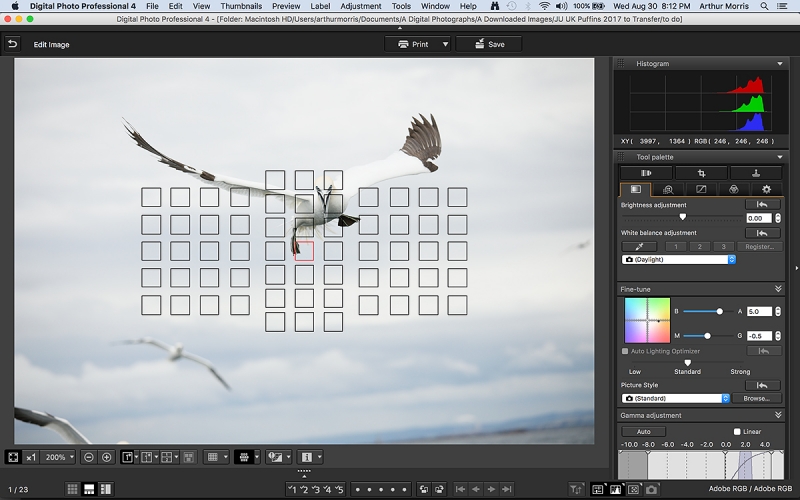
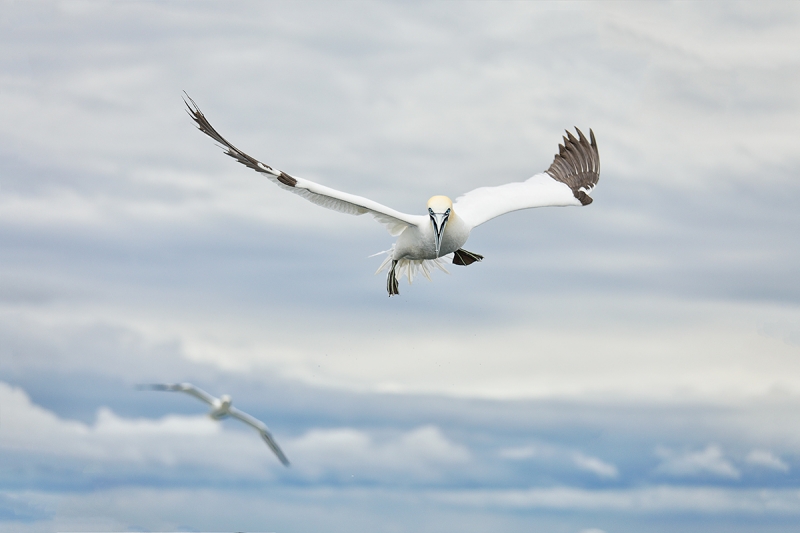
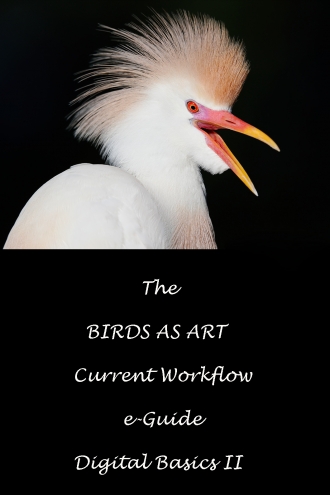
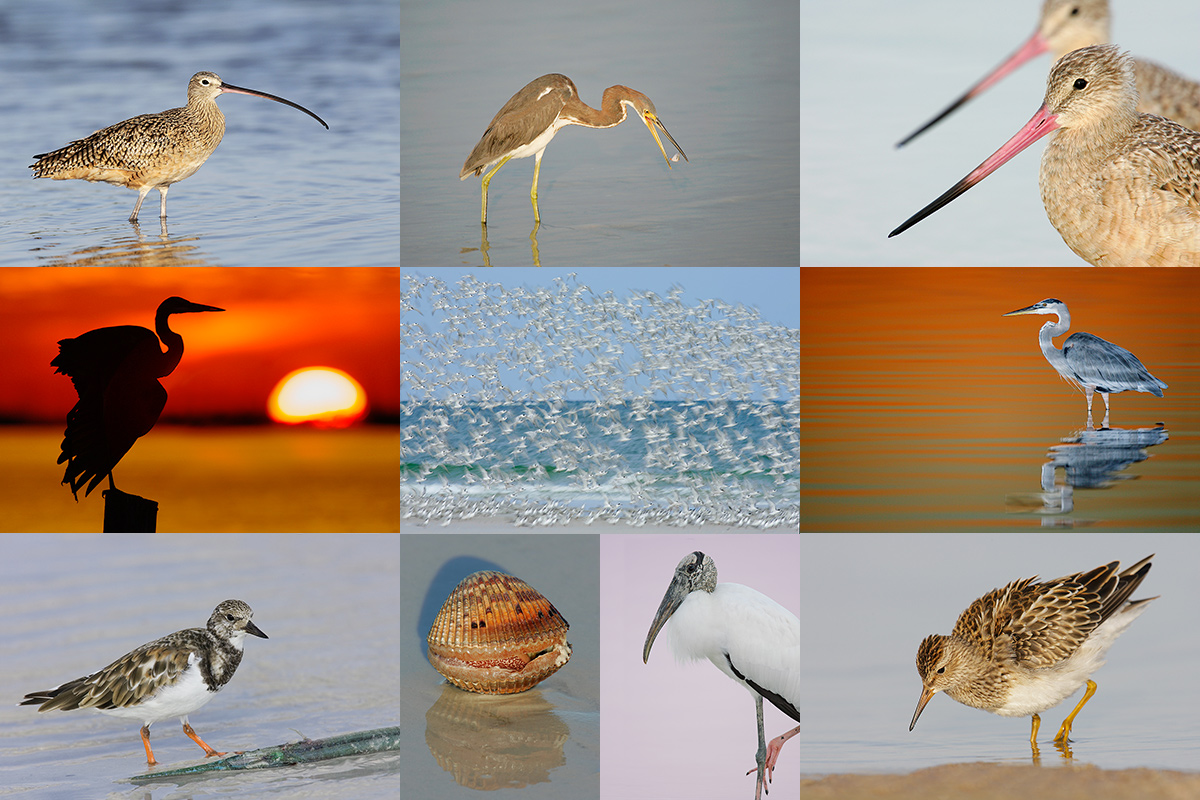
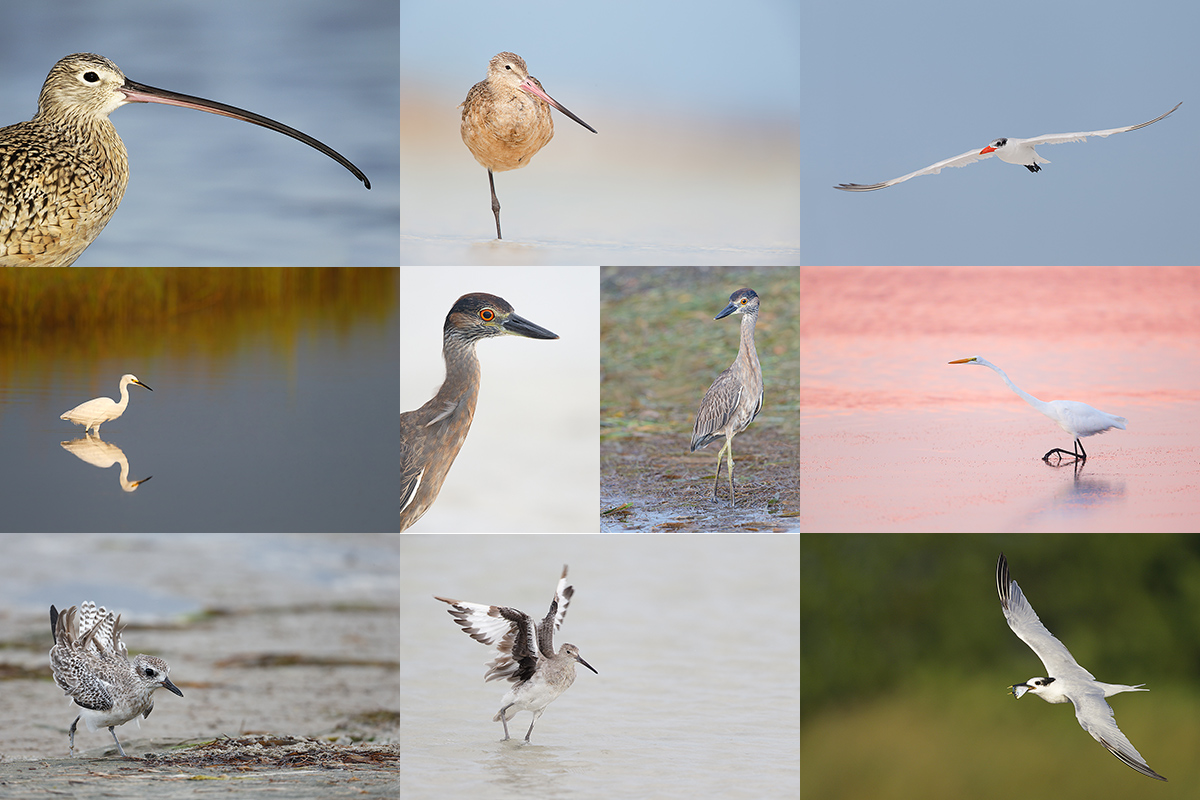







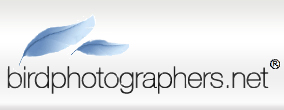


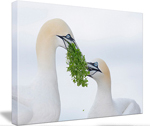



Very pleasing image design….eliminating the unwanted birds, leveling and enhancing the sky made immense improvements. I like the pose of the main subject too.
I am wondering if you went a touch too far right with the exposure? ( the dorsal wing surfaces lack detail and the blacks look a little washed out )
Might just be me….I tend to like images darker than most people 🙂
Hi Joel, Thanks! I hope that you are well. You may very well be right. I thought after the fact that I should have pulled the exposure down 1/6 stop … That said, do understand that bright WHITEs in soft, overcast light will never show much detail at all, if any.
The RGB values for the BLACKs in the bird’s mouth were as low as 0, 0, 0. They were in the low 20s on the feet. But I surely could have darkened the BLACK in the wingtips so you are correct again.
with love, artie